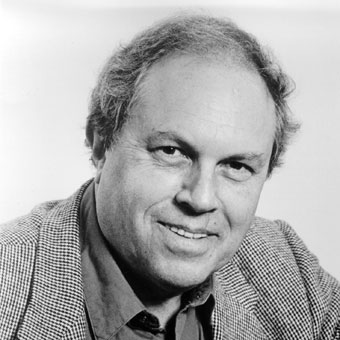
Jacob Druckman
d. 24 May 1996, New Haven, Connecticut
Short Biography:
One of the most prominent of contemporary American composers, Jacob Druckman was born in Philadelphia in 1928. After early training in violin and piano, he enrolled in the Juilliard School in 1949. In 1949 and 1950 he studied at Tanglewood; later, he continued his studies at the Ecole Normale de Musique in Paris (1954-55).
Druckman produced a substantial list of works embracing orchestral, chamber, and vocal media, and did considerable work with electronic music. In 1972, he was awarded the Pulitzer Prize for Windows, his first work for large orchestra. Among his other numerous grants and awards were a Fulbright Grant in 1954, a Thorne Foundation award in 1972, Guggenheim Grants in 1957 and 1968, and the Publication Award from the Society for the Publication of American Music in 1967. Organizations that commissioned his music included Radio France (Shog, 1991); the Chicago Symphony Orchestra (Brangle, 1989); the New York Philharmonic (Concerto for Viola and Orchestra, 1978; Aureole, 1979); the Philadelphia Orchestra (Counterpoise, 1994); the St. Louis Symphony Orchestra (Mirage, 1976); the Juilliard Quartet (String Quartet No. 2, 1966) and numerous others.
Mr. Druckman taught at the Juilliard School, Bard College, and Tanglewood; in addition he was director of the Electronic Music Studio and Professor of Composition at Brooklyn College. In April of 1982, he was appointed composer-in-residence with the New York Philharmonic. In the last years of his life, Mr. Druckman was Professor of Composition at the School of Music at Yale University.
Long Biography:
One of the most prominent of contemporary American composers, Jacob Druckman was born in Philadelphia in 1928. After early training in violin and piano, he enrolled in the Juilliard School in 1949, studying composition with Bernard Wagenaar, Vincent Persichetti, and Peter Mennin. In 1949 and 1950 he studied with Aaron Copland at Tanglewood; later, he continued his studies at the Ecole Normale de Musique in Paris (1954-55).
Critic Mark Swed has written, "At the heart of the works of Jacob Druckman lies the bold, sure, and often arrestingly physical dramatic gesture....Yet Druckman's scores have always exhibited another characteristic as well: that of careful structure, built with meticulous attention to detail. The process of integrating these two sides of his character...has been a consistent factor throughout the composer's development."
Druckman produced a substantial list of works embracing orchestral, chamber, and vocal media, and did considerable work with electronic music. In 1972, he was awarded the Pulitzer Prize for Windows, his first work for large orchestra. Among his other numerous grants and awards were a Fulbright Grant in 1954, a Thorne Foundation award in 1972, Guggenheim Grants in 1957 and 1968, and the Publication Award from the Society for the Publication of American Music in 1967. Organizations that commissioned his music included Radio France (Shog, 1991); the Chicago Symphony Orchestra (Brangle, 1989); the New York Philharmonic (Concerto for Viola and Orchestra, 1978; Aureole, 1979); the Philadelphia Orchestra (Counterpoise, 1994); the Baltimore Symphony (Prism, 1980); the St. Louis Symphony Orchestra (Mirage, 1976); the Juilliard Quartet (String Quartet No. 2, 1966); the Koussevitzky Foundation in the Library of Congress (Windows, 1972); IRCAM (Animus IV, 1977); and numerous others. He also composed for theater, films, and dance.
Druckman taught at the Juilliard School, Bard College, and Tanglewood; in addition he was director of the Electronic Music Studio and Professor of Composition at Brooklyn College. He was also associated with the Columbia-Princeton Electronic Music Center in New York City. In the spring of 1982, he was Resident-In-Music at the American Academy in Rome; in April of that year, he was appointed composer-in-residence with the New York Philharmonic, where he served two two-year terms and was Artistic Director of the HORIZONS music festival. In the last years of his life, Druckman was Professor of Composition at the School of Music at Yale University.
Many of Druckman's works have been recorded, by Deutsche Grammophon, Nonesuch, CRI, New World, and other labels. Recent recordings include Aureole (St. Louis Symphony/Slatkin on New World), Prism (New York Philharmonic/Mehta, New World); and Nor Spell Nor Charm (Orpheus chamber orchestra, Deutsche Grammophon).
Jacob Druckman is published by Boosey & Hawkes.
- April 2010
This biography can be reproduced free of charge in concert programmes with the following credit: Reprinted by kind permission of Boosey & Hawkes
